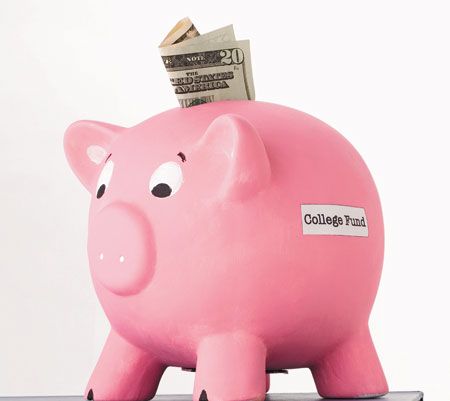Top 10 ways to feel rich even when you're broke
You can live large even when you're paying off student debt.
Next >
Student debt is no fun at all. For some of us, it's a source of constant stress and worry. Here I've outlined my favorite ways to feel like I'm financially successful (perception becomes reality, right?). We must change our habits if we want to crawl out from under our debt. Unfortunately, habits can be extremely difficult to change. But once you start making small changes, the exercise becomes more fun-and the benefits start becoming more tangible. So get to work!

No. 1
Pay ahead on your student loan. If you read my previous article “David vs. Goliath” (see the May 2012 issue or visit dvm360.com/campfield), you know I've taken an extreme approach to my student debt. That approach may not be for you, but you could at least try getting ahead a few months on your loan payments. When you receive your loan statement in March and see a “next payment due” date of June or July, it will relieve a little of that feeling of pressure to make your next payment on time. And it's nice to know you have a few months' cushion if any unplanned expenses come your way.

No. 2
Stop eating out and change some eating habits. Or at least stop eating out frequently. Those $5 subs can really add up. Pack a lunch. Start experimenting with more fun and different foods to pack up. This takes some time and planning, of course. One method that has worked for me is to cook a big batch of something and Tupperware it up for four or five meals. Sure, the fifth day of lasagna at work gets a bit old-tastes a little past its prime? That's the taste of savings, my friend! Please exercise proper food safety when implementing Tip No. 2.
Also, check out the website artisanbreadinfive.com. It has some great resources to teach you how to bake your own bread at home. It's fun, healthy, cheap and delicious! This year I also learned to make my own preserves that I could share with family and friends-cheap smiles all around. With all the money you save, go out to a really nice restaurant from time to time and savor the benefits of changing your day-to-day habits.

No. 3
Shop for something extravagant, but don't buy it. This one is by far my favorite. But beware: Do not attempt this if you know you lack the willpower to prevent you from buying something you shouldn't.
It might be safest to start with something small, like a new jacket, just in case you can't follow through with the whole plan. Here's how it works: Pick something you would really like to purchase but you know you can't afford-for example, a brand new car, new appliances for your home, million-dollar real estate and so on. Now go shop for it. Research and shop around until you know everything about the purchase. Weigh all the options; investigate all the intricacies; study all the details. Keep doing this until you're so sick of shopping for the item that you don't even want it anymore! And then don't buy it. What happens here is that you'll waste so much time researching something you know that you can't afford that you'll get sick of it-and not spending will start becoming more automatic. But one day (especially after implementing all these great tips) you'll be better off financially, in which case you'll have already done the research needed to buy your dream car or home.

No. 4
Increase your savings a little bit. Many banks have options for automatic monthly transfers from your checking to your savings account, and having some liquid savings that you don't touch is a good idea. (Plus there's the interest-my savings account earned me a whopping $3.53 in 2012!) If you can increase your monthly savings just a little bit-even $25 or $50-that will add up over time. This is why I like the monthly automatic option. I can periodically bump up the savings amount and forget about it, then the bank does the rest for me each month.

No. 5
Do not buy a new car. There's a lot to be said for staying in your old beater. Maybe you don't look the coolest, and perhaps it even smells a little funny (OK, I've said too much). Maybe that $450 per month interest-free financing on a nice shiny new one seems like a really great idea. Just remember that a car salesman's job is to get you to believe that you can afford the most that you actually cannot. And take a look at what that $450 a month extra would do for you long-term if it went toward your student loan. Another plus to being in a crappy car: Recently on my way to work I saw a boxer running down the street that looked like she'd been hit by a car. I stopped, opened the passenger door and called her over. She jumped right in (yes, a boxer) and proceeded to slobber and bleed all over me and the inside of my car. There's no way I would have stopped to pick her up had I been in a nice new car. See, the animals also benefit from Tip No. 5.

No. 6
Put a new sticker on your old car. Whenever I am thinking about trading in ol' Betsy, I have a little talk with myself about how I can't really afford it. Then I slap a new sticker on the back windshield. This adds a nice little piece of flair and only costs a buck or two. It's enough of a change that it makes me feel like I'm climbing into a different car. I'm not sure what I'll do when all of the windows are covered, but for now this is working. Please adhere to your local laws regarding car window coverings when implementing Tip No. 6.

No. 7
Have a dream that you went on a dream vacation. OK, we can't always control our dreams. But when it happens, that equals savings. One day I woke up from a nap during which I dreamed I was sipping margaritas in the tropics somewhere. I woke up very satisfied and knew that I had just saved at least a couple of thousand bucks in airfare and vacation costs, not to mention the days off that I didn't have to ask for.

No. 8
Spend time on your physical fitness and personal well-being. I wish I did this one more. There are some really cheap gym memberships out there if you shop around. Going for a run with your dog is almost free (bring a plastic bag just in case), and when we feel better about our physical fitness we feel better about life, which helps that debt burden seem less significant. Also, anything you can do to increase your long-term health and prevent future medical bills will pay off down the road. Consult with your physician before starting an exercise program.

No. 9
Learn something new. As veterinarians, we have grown up with a need for learning. For those of us less than five years out of school, the grind of working every day is a big change from our previous life of sitting in a classroom. Tip No. 9 won't necessarily give you any direct financial savings, but it might give you a new challenge and spark some inspiration. Look into interesting classes at your local community college. Take a music or cooking class, join a book group-learning to fly a plane is probably great fun but may not be the best choice in the interest of being frugal. Find something local that fits into your schedule, lifestyle and budget.

No. 10
Get a new puppy (no, don't do this). Bad idea, but maybe the vet bills won't be so bad if you have a nice employer. If you decide to get a new puppy, be prepared to replace all of your shoes and spend time filling in all the holes in your backyard. A possible plus is that your new puppy will be a loyal family member that you won't have to shop for next holiday season if you don't want to. And that equals savings in my book.